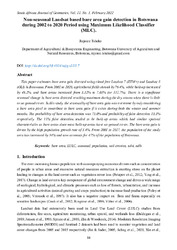Non-seasonal Landsat based bare area gain detection in Botswana during 2002 to 2020 Period using Maximum Likelihood Classifier (MLC).
Abstract
This paper estimates bare area gain detected using cloud free Landsat 7 (ETM+) and Landsat 8 (OLI) in Botswana. From 2002 to 2020, agricultural fields shrunk by 76.4%, while built-up increased by 49.2%, and bare areas increased from 3.32% to 7.03% (or 111.7%). There is a significant seasonal change in bare area detected reaching maximum during the dry season when there is little or no ground cover. In this study, the seasonality of bare area gain was overcome by only considering a bare area pixel to contribute to bare area gain if it exists during both the winter and summer months. The probability of bare area detection was 75.0% and probability of false detection 13.3% respectively. The 13% false detection tended to be built-up areas which had similar spectral characteristics as bare areas since most built-up areas have no ground cover. The bare area gain is driven by the high population growth rate of 3.4%. From 2001 to 2017, the population of the study area has increased by 34% and now accounts for 47% of the population of Botswana.
Collections
- Reseach articles [146]

